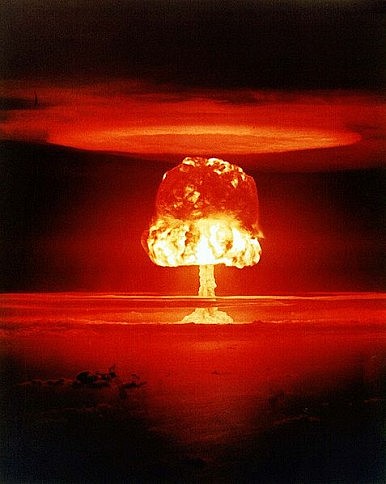Image Credit: Wikimedia Commons
Iran and world powers finally clenched a long awaited nuclear deal earlier this week. As The Diplomat‘s Ankit Panda points out, the deal is written quite well, enough to ensure Iranian compliance because sanctions can easily be reimposed if Iran cheats. In any case, it is highly unlikely that Iran will cheat, or cheat too explicitly. Why would Iran do so anyhow? Iran’s leaders agreed to negotiations because they are rational actors–contrary to what some American politicians believe–who value the survival of their governmental system and the national’s welfare enough to negotiate.
Therefore, it is highly unlikely that Iran will take actions that explicitly violate the terms of the nuclear deal. The deal fits broadly with Iran’s goals of expanding its influence in the Middle East because it helps Iran’s economy and ends its political isolation, which would speed up its reintegration into the global system, giving it both the power and respect that Iran has always craved. Moreover, other Asian powers like Russia, India, and China are all happy with the deal; this could in fact mark the moment, along with recent developments with the Asian Infrastructure Investment Bank (AIIB) and Shanghai Cooperation Organization (SCO) that a new Asian multilateral order emerged in a quadrangle formation with four major civilizational hubs (Russia, China, India, and Iran).
But to pause for a second: let us say that Iran does fudge a bit. So what? Is it really a big deal? First, there is the nature of the Iranian state and its foreign policy goals. There is no doubt that Iran wishes to aggrandize its influence in the Middle East, something that has annoyed most of its neighbors, from Israel, to the Arab states, to Turkey. But whenever it expands its influence, it has usually been a source of relative stability, propping up its clients to bring a measure of order in otherwise failing states. And in this sense, Iran is hardly any different from its neighbors like Turkey and Saudi Arabia, which have links to groups that are equally if not more unsavory that those that Iran supports. Iran’s reputation as a uniquely evil adversary in the United States is the result of decades of by hawks from the United States, Saudi Arabia, and Israel. They’re not wrong that Iran is difficult, difficult like China has been even though Nixon went there. But that doesn’t mean it can’t be negotiated with.
And while some Iranian proxies have committed terrorist attacks, those are few and far between, especially as the “zealous” phase of the Iranian revolution fades to more realistic concerns. Compared to its neighbor, Pakistan, which actually has nuclear weapons, Iran’s proxies have engaged in many more stabilizing activities rather than random terrorist attacks that accomplish nothing geopolitically (Pakistan).
Speaking of Pakistan, Pakistan is a good example for understanding why Iran’s potential acquisition of a nuke is no big deal. Pakistan has often used its nuclear weapons as a shield behind which to sponsor terrorist attacks against India, but all in all, the sky didn’t fall when Pakistan, a state that sponsors militant groups and one that is considerably weaker in terms of governance than Iran and not in control of portions of its territory and military, acquired nuclear weapons.
The decision to go nuclear is at this point for Iran essentially a political decision – one that has not yet been taken for the obvious reasons that Iran’s leaders fear the consequences of doing so. The technological capacity is essentially there, but it is quite possible Iran will sit on it for a while. Pakistan had the chance to build a nuclear weapon as early as 1984 but only went public with a nuclear test in 1998. So if Iran even were to assemble a nuclear weapon, it would keep it hidden and quiet, hardly the actions of a country that reportedly would want to use it at the earliest.
And even if Iran were to go nuclear officially, it would obviously never use the weapon unilaterally against, say, Israel. That would invite the utter destruction of Iran, which is the opposite goal of acquiring a nuclear weapon in the first place, survival, and secondarily, influence (you can’t have influence if your country is incinerated). Additionally, it is highly unlikely that the Middle East would go nuclear in response to an Iranian bomb. No Arab state has the industrial or technical capacity to build their own weapons. Furthermore, the United States, which wields considerably more influence in Arab world than in Iran, could exert more influence to prevent this and also potentially offer to provide a nuclear shield at some point to these states. Saudi Arabia, at the most, may buy a weapon off the shelf, but the most likely seller, Pakistan, has proved surprisingly resistant in getting involved in the Iran-Saudi Arabia proxy war. Finally, Turkey, the country in the region with the best ability to follow Iran’s lead is unlikely to go through the trouble and stigma in acquiring nuclear weapons, especially since it is protected by NATO.
Therefore, while unlikely, it would not be a big deal if Iran acquired nuclear weapons. Like Pakistan, it would quickly come to terms with the limitations of such weapons. In fact, by bringing countries closer to the abyss, nuclear weapons make them more aware of the consequences of foolish actions. Pakistan, a more unstable and dangerous state than Iran, has nuclear weapons and the world does not do much about this. That suggests that we can also live with a nuclear Iran if that comes to pass in the future.
sourche: http://thediplomat.com/2015/07/who-cares-if-iran-gets-a-nuke-lessons-from-pakistan/

Δεν υπάρχουν σχόλια:
Δημοσίευση σχολίου